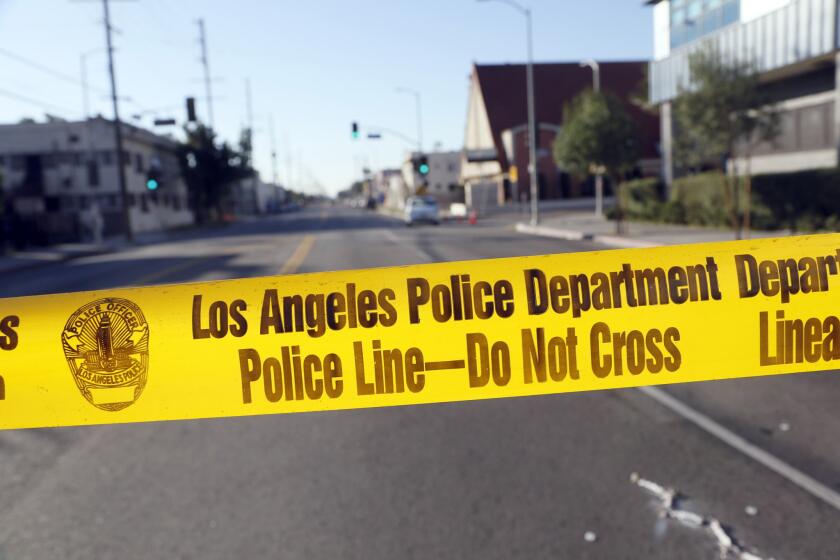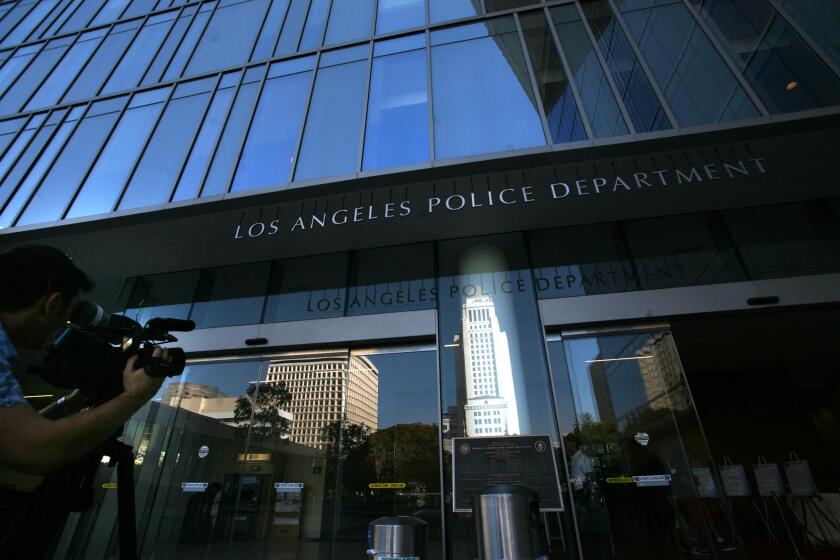L.A. agrees to pay four LAPD officers $30K each over disputed ‘Blue Flu’ claims

- Share via
The city of Los Angeles agreed this week to pay $30,000 each to four LAPD officers who alleged in state court that they were wrongfully disciplined for participating in a “blue flu” protest action last summer.
The four officers claimed to have legitimate reasons for calling out sick over the July 4 weekend, when the Los Angeles Police Department alleged that hundreds of officers had engaged in an illegal labor action by calling out sick en masse to send a political message. The officers alleged the discipline they received was unlawful and harmed their careers.
The payouts came in four individual judgments against the city, which city attorneys accepted — along with blame in the case — rather than going to trial over the claims.
Courtney McNicholas, an attorney for officers Diego Aguilar, Ryan Putnam, Luis Rodarte and Meggan Stroup, said the judgments vindicated her clients and provided them with professional security moving forward.
“If at any time this comes back on them — like, ‘Oh, I heard you were a blue fluer,’ things like that, which can happen — they can say: ‘Wrong. I was right. I got a judgment,’” McNicholas said.
LAPD officials are investigating whether a spike in officers calling in sick over the July 4 weekend was the result of an orchestrated protest.
Capt. Stacy Spell, an LAPD spokesman, declined to comment on the judgments Thursday.
The four officers filed their claims after the LAPD decided to sanction hundreds of officers who called out sick over the July 4 weekend.
The unusually high number of call-outs, which came on a weekend of heightened gun violence in the city, followed weeks of protests against police brutality, a City Council decision to cut the LAPD budget and the circulation of an anonymous letter calling on officers to call out sick to defend their interests.
“They succeeded in defunding the police; what do you think is next? Our pay? Our benefits? Our pensions? You’re God Damn right all those things are in jeopardy now,” read the letter, which was obtained by The Times. “We have to send the city a clear message that we are not expendable and we are not going to take this crap anymore.”
In certain anti-gang units, many officers called in sick at once, sources told The Times.
Such an orchestrated labor action would be illegal, LAPD officials said, and Chief Michel Moore said the department was taking it seriously and launching an investigation into the matter.
Matthew McNicholas, another attorney for the four officers, said the department proceeded to file “action items” against anyone who had called out sick without considering individual reasons or diagnoses justifying the absences.
“I believe the chief was upset, and this is what he did,” McNicholas said. “It’s a bad, bad decision.”
Two L.A. police officers have alleged in separate lawsuits that they were illegally disciplined after being wrongly accused of faking an illness as part of a “Blue Flu” protest.
Such action items are linked to various misconduct databases within the LAPD and can follow an officer throughout their career, preventing promotions and in some cases even leading to demotions and loss of income, McNicholas said.
How the decision affected officers varied, but some faced serious repercussions.
In one example, Rodarte — who had informed his direct supervisor that he needed to take off to care for his sick daughter — was removed from a coveted gang enforcement detail and reassigned to patrol after being accused of being a blue fluer, his complaint alleged.
McNicholas said the department later walked back its decision to universally penalize everyone who called out that weekend, removing the action items from their files. He said he believed it did so in part because of objections from the police union, but also because the four officers’ lawsuits had proven the discipline was wrongheaded and unlawful.
The department, he said, was “casting a net that was way, way, way too big.”
More to Read
Sign up for Essential California
The most important California stories and recommendations in your inbox every morning.
You may occasionally receive promotional content from the Los Angeles Times.












